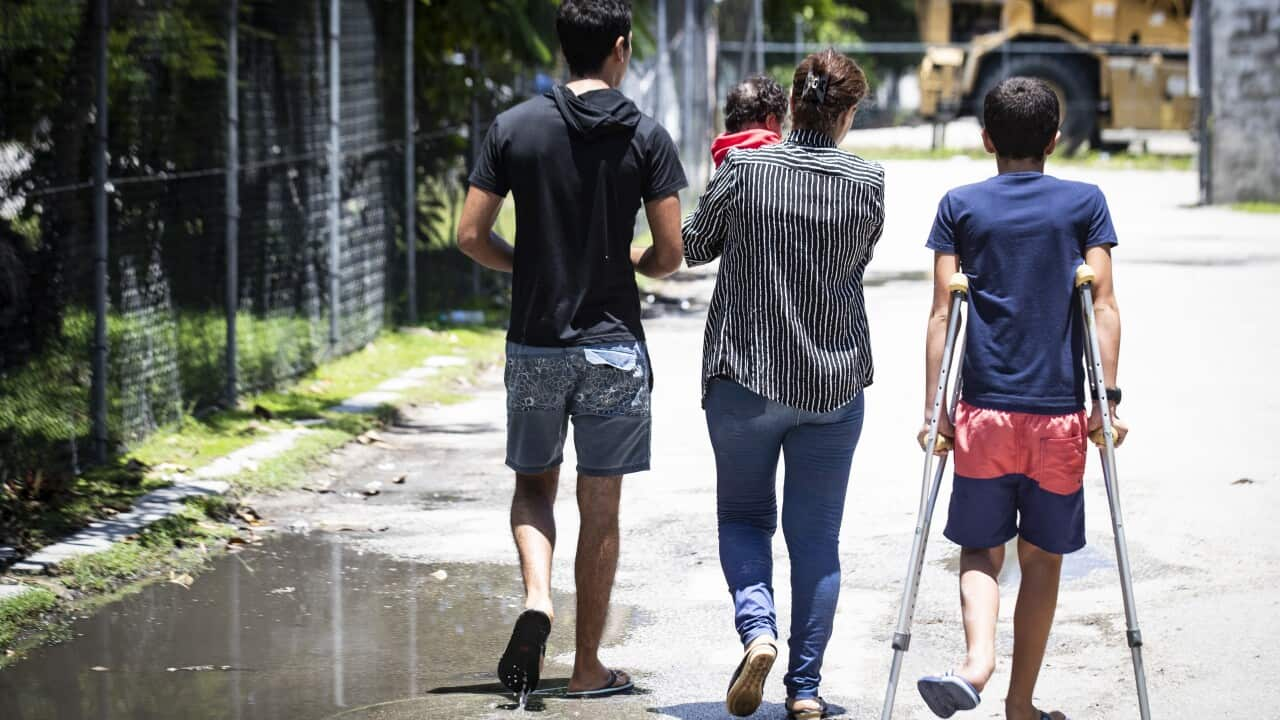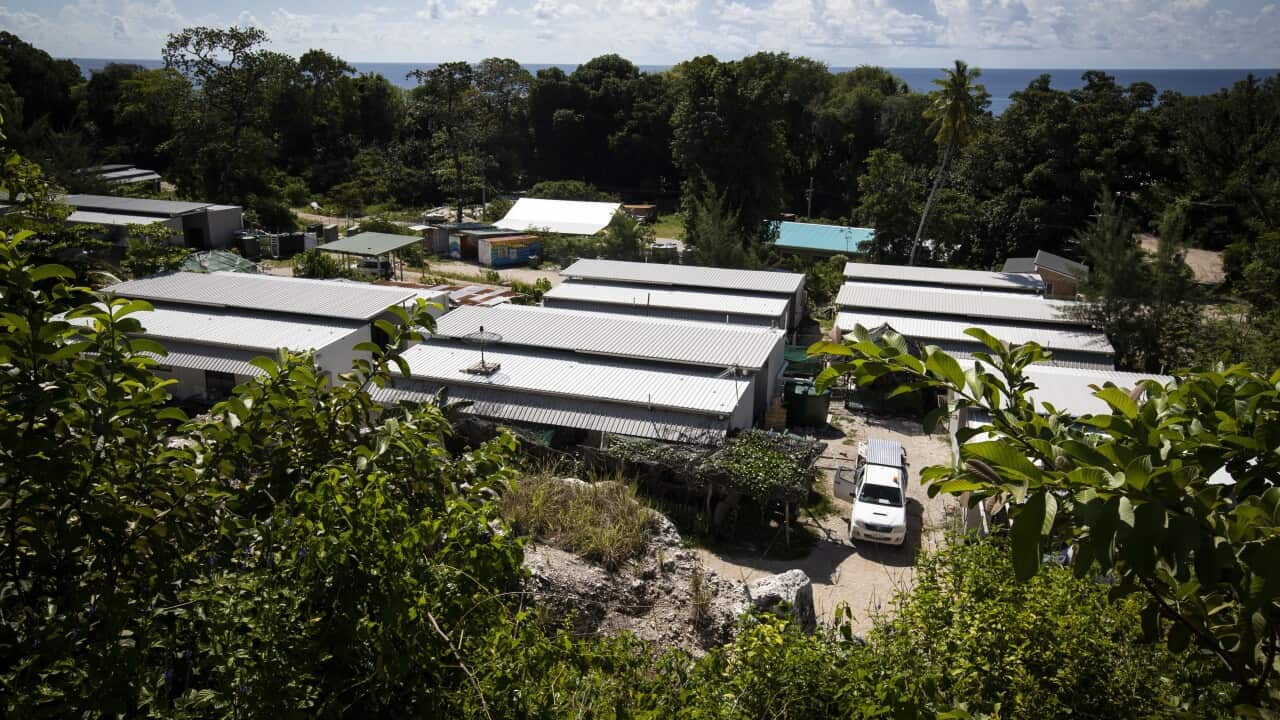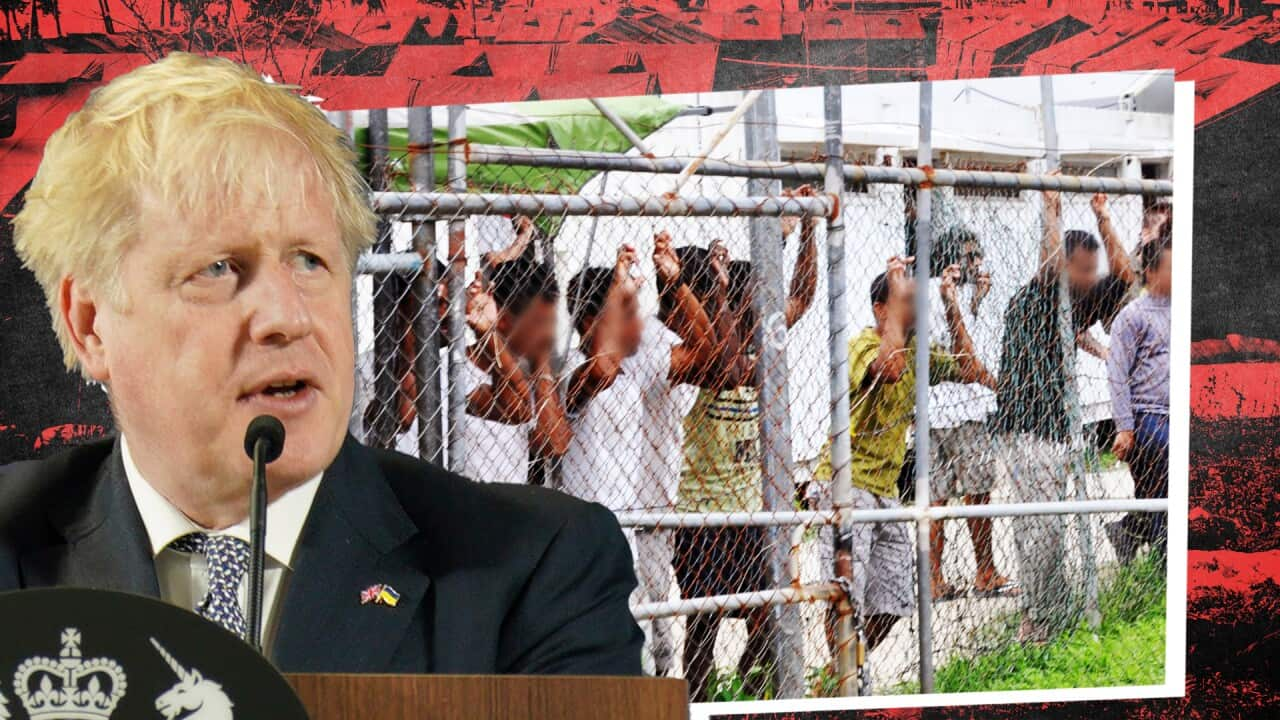This article contains references to suicide/self-harm.
Asylum seekers who were held in Australia's in Manus and Nauru have appealed to foreign governments not to implement what they called a "horrific" immigration policy similar to Australia's.
It follows UK's Home Secretary Suella Braverman calls for the deportation of asylum seekers to Rwanda for "processing, asylum, and resettlement" to go ahead.
The first flight carrying refugees to Rwanda was after a legal battle, but the home secretary wants to proceed with the Conservative's immigration policy, which experts say is based on Australia's.
“I would love to have a front page of The Telegraph with a plane taking off to Rwanda, that’s my dream, it’s my obsession,” Ms Braverman told podcast Chopper’s Politics in October.
In 2013, Roman fled Iran escaping persecution, and tried to travel to Australia by boat. He was stopped by Australian authorities and brought to Christmas Island, then to Nauru, where he was told his case would be "processed".
After his experience being held at Nauru, Roman has a stark message for the UK government.
"It would be easier to just kill people, because I don't see any difference," he said.
"Slowly, you put them on a remote island and you create a perfect environment for them to either be killed by the hands of authorities or by their own."
The Refugee Council of Australia said in a 2021 report that 12 people in detention "lost their lives on Nauru and in Papua New Guinea" and "mainly as a result of inadequate healthcare or by suicide".
"You get sick physically and mentally and you collapse," he said.
"I was lucky to survive."
Due to his health deteriorating, Roman was eventually transferred to Australia, where he says while he is "technically still in detention," he owes it to the Australian people who campaigned to let asylum seekers like him stay.
Mustafa fled Afghanistan and also tried coming to Australia by boat. He was caught by Australian authorities, brought to Christmas Island and then transferred to Nauru for "processing". He has since been detained in offshore and onshore facilities for eight years.
"That jail for refugees and asylum seekers — it's like hell," he said.
"Don't do it. This is really not good if they open other camps for asylum seekers.
"People are getting killed, mentally, in these camps."
Zaki Haidari, a refugee campaigner for Amnesty International, said Australia's offshore detention policy has been a "failure".
"I have friends that were detained in Nauru and PNG," he said.
"They keep telling me that they are not the same person they were before coming to Australia.
"They can't even function as a normal human being — they're broken mentally being detained on an island, but also physically they are damaged because of the neglect that has been done to them by contractors."
He said many of them give up hope.
"When you talk to them, they have no hope for the future," he said.
"They even don't want to live anymore.
"It's a policy that has damaged Australia's reputation and has cost billions of dollars."
A spokesperson for the Department of Home Affairs told SBS News "Australia exited regional processing arrangements in Papua New Guinea on 31 December 2021" and did not address allegations of the poor treatment of former asylum seekers on Nauru and Manus Island.
"All transferees in Nauru reside in community accommodation. No transferees are in detention," the spokesperson said.
In the October budget, an increase of $150 million in spending this financial year on offshore processing, expanding the 2022-23 allocation to $632.5 million.
Is the UK is trying to 'mimic' Australia's system?
Professor of Conflict, Peace and Security at the University of Maastricht Khalid Koser, who recently wrote a report for the Lowy Institute, said the UK's Conservative Party was trying to "mimic" Australia's offshore detention system.
In the "Can the UK Stop the Boats?" report, he said the UK’s Rwanda policy is "broadly based on Australia’s offshore processing model" adding that Australia’s former foreign affairs minister Alexander Downer has joined an independent panel to oversee its implementation in the UK.
Earlier this year, Mr Downer was featured in a Home Office video promoting the Rwanda policy.
Professor Koser told SBS News that the UK "needs to do better than mimic a hugely controversial policy from the other side of the world".
"The Rwanda policy will not stop the boats, disrupt smuggling networks, or save lives; but it will win some hardcore votes, and that may be enough for this government to continue with it," he said.
He said the Rwanda policy would not work, for a range of reasons, including the fact that it likely wouldn't deter migrants from travelling to the UK.
"First, the policy already has, and will continue to face legal challenges," he said.
"Second, these challenges, combined with the fact that the policy will almost certainly be scrapped under a likely new Labour government in the next two years, means that the policy cannot be implemented as absolutely as it was in Australia.
"And third, even if the policy were to be implemented effectively and comprehensively, it would still not deter further migrants, who arrive in the UK because of strong family and friendship ties, and because they know they can find illegal work there."
The plan was introduced by the UK's former home secretary Priti Patel, and aligns with the Conservative party's stance on stopping asylum seekers from travelling to the UK.
Daniel Ghezelbash, deputy director of the Andrew and Renata Kaldor Centre for International Refugee Law, told SBS News that Australia's offshore processing system is based on the United States' Guantanamo Bay detention camp.
More commonly referred to as Guantanamo Bay, the prison is used to keep people accused of being enemy combatants without trial for indefinite periods of time.
While the absence of due process goes against the United States constitution, the prison is located in Cuba, acting as a loophole for the US government to undertake such an operation.
"It's not only similar, but it is literally the model on which it is based," Associate Professor Ghezelbash said.
He said the US, like Australia, operate "de facto control" over these regions to treat refugees or suspects "however they want".
"The legal obligations and the US law do not to apply so they can treat them however they like.
Readers seeking crisis support can contact Lifeline on 13 11 14, the Suicide Call Back Service on 1300 659 467 and Kids Helpline on 1800 55 1800 (for young people aged up to 25). More information and support with mental health is available at and on 1300 22 4636.
supports people from culturally and linguistically diverse backgrounds.





